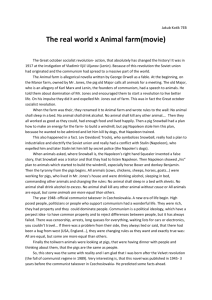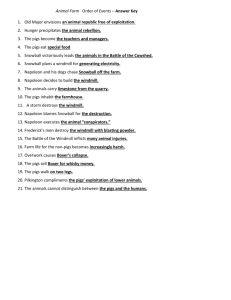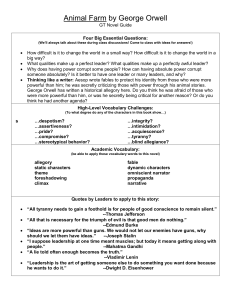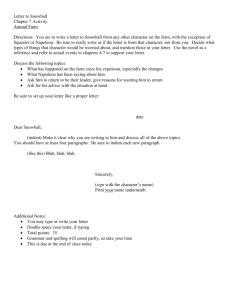Animal Farm
advertisement
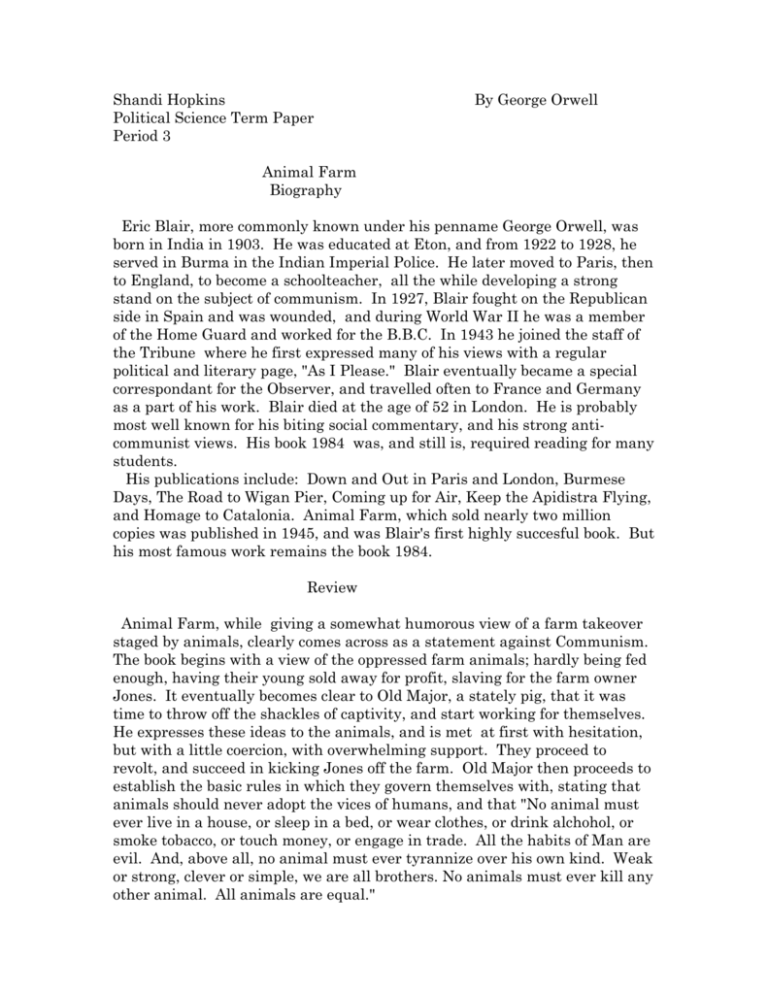
Shandi Hopkins Political Science Term Paper Period 3 By George Orwell Animal Farm Biography Eric Blair, more commonly known under his penname George Orwell, was born in India in 1903. He was educated at Eton, and from 1922 to 1928, he served in Burma in the Indian Imperial Police. He later moved to Paris, then to England, to become a schoolteacher, all the while developing a strong stand on the subject of communism. In 1927, Blair fought on the Republican side in Spain and was wounded, and during World War II he was a member of the Home Guard and worked for the B.B.C. In 1943 he joined the staff of the Tribune where he first expressed many of his views with a regular political and literary page, "As I Please." Blair eventually became a special correspondant for the Observer, and travelled often to France and Germany as a part of his work. Blair died at the age of 52 in London. He is probably most well known for his biting social commentary, and his strong anticommunist views. His book 1984 was, and still is, required reading for many students. His publications include: Down and Out in Paris and London, Burmese Days, The Road to Wigan Pier, Coming up for Air, Keep the Apidistra Flying, and Homage to Catalonia. Animal Farm, which sold nearly two million copies was published in 1945, and was Blair's first highly succesful book. But his most famous work remains the book 1984. Review Animal Farm, while giving a somewhat humorous view of a farm takeover staged by animals, clearly comes across as a statement against Communism. The book begins with a view of the oppressed farm animals; hardly being fed enough, having their young sold away for profit, slaving for the farm owner Jones. It eventually becomes clear to Old Major, a stately pig, that it was time to throw off the shackles of captivity, and start working for themselves. He expresses these ideas to the animals, and is met at first with hesitation, but with a little coercion, with overwhelming support. They proceed to revolt, and succeed in kicking Jones off the farm. Old Major then proceeds to establish the basic rules in which they govern themselves with, stating that animals should never adopt the vices of humans, and that "No animal must ever live in a house, or sleep in a bed, or wear clothes, or drink alchohol, or smoke tobacco, or touch money, or engage in trade. All the habits of Man are evil. And, above all, no animal must ever tyrannize over his own kind. Weak or strong, clever or simple, we are all brothers. No animals must ever kill any other animal. All animals are equal." After Old Major dies three days later, two younger pigs, Snowball and Napoleon, proceed to take a position of leadership. It is then that the pigs begin to make many of the important decisions of the farm, and the road to tyranny begins. The pigs, (being the only ones who could read and write with any amount of accuracy) then put up the rules echoed by Old Major before he died, known as the Seven Commandments. They were: 1: Whatever goes upon two legs is an enemy. 2: Whatever goes upon four legs, or has wings, is a friend. 3: No animal shall wear clothes. 4: No animal shall sleep in a bed. 5: No animal shall drink alchohol. 6: No animal shall kill any other animal. 7: All animals are equal. Eventually, the pigs began to completely dominate the decision making process, and they often used the simple minded, strong animals, such as Boxer the horse to impress upon others their beliefs. The animals though, did have a better life than when Jones was there. They were fed enough, didn't have as long hours, and didn't always have a whip cracking at their backs. The main point for the animals though, was that even though they worked almost as hard now as they did when they worked for Jones, it didn't really matter since they were working for themselves. The sheep also were known from time to time, to interrupt meetings with their bleatings of: "Four legs good, two legs bad!", signifying the importance of staying away from the evils of humanity. Snowball and Napoleon often disagreed about how things should proceed on the farm; often not because of any real dispute, but for the sake of taking different sides of the matter. This rapidly grew into a bitter rivalry, and culminated in a dispute over whether or not the animals should build a windmill. Snowball thought that it was a good idea, while Napolean vehemently disagreed; again, just for the sake of disagreeing. Up until this point, decisions were made by the pigs, but it was usually a cooperative effort. Then something happened which changed the face of the farm forever. Napoleon, having taken nine puppies away from their mother many years ago, let these ferocious dogs out to attack Snowball. Snowball barely escaped with his life, never to be seen again, and the animals never really questioned the might of Napoleon from that point on. Napoleon then became the resident dictator. He awarded himself all kinds of medals and honors, made sure that any disagreement was dealt with severely, and began to adopt many of the ideals that the animals had originally fought so hard against. Napoleon began dealing with humans, setting up trade with other farms, and began to change some of the original commandments without the illiterate animals knowing. Through his subordinates, he convinced the animals that many of the things that had been set forth by Old Major had really never been said; owing it all to treason by Snowball; the new scapegoat for everything that went wrong on the farm.) Napoleon re-named the farm from "Animal Farm" to "Manor Farm", the name that was used when Jones was there. The pigs moved into the farmhouse. Muriel the horse, vaguely remembering something in the commandments that said that no animal shall sleep in beds, asked one of her friends to read her the fourth commandment. Strangely enough, instead of what she thought it had said, it now read: No animal shall sleep in a bed with sheets. This occured time and time again, with Squealer, Napoleon's spokesman saying that it was a product of a poor memory, or that Snowball had lied to them. Things grew worse on the farm, with much of their resources going to the building of the windmill. And after it was destroyed, Napoleon decided that it was time to raise some capital in order to begin rebuilding it. He bargained over a price with the two nearby farmers, Frederick and Pilkington, constantly declaring one of them the enemy, (the one who was offering the lower price) until eventually, he sold the lumber to Frederick. After discovering that the money had been counterfeit, he told everyone that Snowball had been the mastermind of the entire operation, and declared Frederick the enemy. A confrontation with Fredrick and his men ensued, and the windmill was destroyed again. To make matters worse, their workhorse, Boxer had taken ill, and without him, rebuilding the windmill would be near impossible. After fighting Frederick's men back, Napoleon retreated into the house, where it was rumored that he had been drinking some of Jones' alchohol. Squealer declared that he had some bad news the next morning; that their "Comrade Leader", (as Napoleon was now called) was dying. This statement was rescinded of course after Napoleon got over his hangover! Years went by, and many of the old animals died, leaving only a few animals left, (excluding the pigs) that remembered what life was like before the revolt. The windmill had been rebuilt finally, but had not been used for the purpose originally stated; that of supplying electricity and running water to all the animals. Instead, it was used for milling corn, bringing in great profits for Napoleon, while he dismissed the original intent of the windmill as "contrary to the spirit of Animalism." Napoleon and the other pigs continued to adopt more and more human values until one day it finally happened. The pigs came marching out of the house, a bit wobbly at first, on their hind legs Napoleon emerged from the rear, carrying a whip. The sheep began their bleating again, except this time with a small change. "Four legs good, two legs better!" The animals rushed to the fence where the 7 commandments had been written. All that remained there now was a single commandment: "All animals are equal, but some animals are more equal than others." The animals, returning to the front of the house in a daze of confusion, peered in. There they saw pigs and humans joking and laughing together, toasting themselves, and discussing things as if they were old friends. Then a funny thing happened. Images began to blur, and shapes refocused themselves in the eyes of the animals until it was impossible for them to discern among the gathering, which were the humans, and which were the pigs. The transformation had become complete. Opinion Animal farm is an important book that should be used in examining communist societies, and in formulating our thoughts about its goods and evils. Although, as with any political philosophy, it should be taken with a grain of salt. The development of the struggle for freedom, which was the original intent of the revolt, to the tyranny practiced by the small all-powerful pigs is an important lesson in the behavior of mankind, and shows that oftentimes what seems to be a reasonable and decent goal can be twisted around and given a new meaning, until the only ones that can really understand what is happening are the ones in power. As evidenced by the Soviet Union, the overthrow of the Tzar was not in itself evil in any way. The evolution though, of a small group of people with complete control over what is taught and said in the society is wrong. It is this manipulation of the people that we must be on guard for. In 1984, the author described the constant changing of facts; the people not knowing what was reality, and what was fiction. But since Big Brother was always right, they accepted what they were told unconditionally. The same was true in Animal Farm, with the modification of the 7 commandments. The animals were kept ignorant of what was going on around them, so as to let the pigs tell them what they wanted to tell them, and have them believe what they wanted them to believe. Napoleon's gradual change from being one of the leaders of the animals to the dictator also makes a statement about power in a communist system. The author is saying here that since a communist society is controlled in many ways, it makes it far easier for someone to take absolute power into their own hands. Napoleon's taking of power by force also makes the point that the violence advocated in the communist ideology may lead to the acceptance of further violence later; with the leader being able to justify it as a necessary evil in order to further the progress of all people. The author does indeed succeed in making these points, but I believe that it is innacurate to generalize all of communist values into the broad statement that all communist societies are inherently evil, and will eventually lead to the kind of situation depicted in the book. The book though, is definitely worth reading, and is an important lesson in power and how we govern ourselves.


